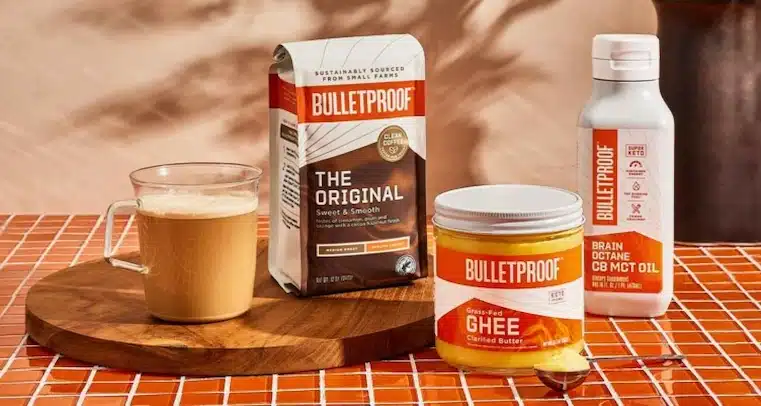Bulletproof coffee burst onto the health scene several years ago, promising boosted energy, sharper mental clarity, and even effortless weight loss. Combining coffee with butter and medium-chain triglyceride (MCT) oil, this creamy, high-fat drink quickly became a morning favourite, especially among keto dieters and biohackers. But now, in 2025, is bulletproof coffee still living up to its lofty claims—or has science poured cold water on the trend?

What Exactly Is Bulletproof Coffee?
Bulletproof coffee, originally popularized by entrepreneur Dave Asprey, blends freshly brewed coffee with unsalted grass-fed butter and MCT oil—a concentrated form of fat derived from coconut or palm oil. Fans of Bulletproof Boffee typically drink it as a breakfast substitute, claiming it helps sustain energy levels, supports weight management, and sharpens mental focus.
While the idea of adding butter to coffee initially raised eyebrows, many enthusiasts embraced it, believing this combination of caffeine and healthy fats would keep them energized and focused longer than traditional breakfasts.
The Real Benefits: What Recent Research Says
So, does bulletproof coffee truly deliver on its promises? Recent research tells a mixed story.
📌 Bulletproof Coffee Benefits
- Temporarily suppresses appetite, which can be helpful for those practicing intermittent fasting.
- Provides a source of quick energy from MCT oil for those following a keto diet.
However, beyond appetite suppression, science hasn’t found many unique benefits. Recent studies haven’t supported claims about bulletproof coffee enhancing cognitive performance or significantly boosting energy levels. It turns out the mental clarity many experience may simply come from caffeine, not the added fats.

How to Make Bulletproof Coffee
To prepare bulletproof coffee:
- Brew high-quality coffee
- Add 1-2 tablespoons of unsalted grass-fed butter
- Add 1-2 tablespoons of MCT oil
- Blend until frothy and creamy
The Drawbacks You Need to Know
Despite its loyal following, bulletproof coffee has several significant downsides that health experts continue to emphasize.
🚩 High in Saturated Fat: The butter and MCT oil in bulletproof coffee make it extraordinarily high in saturated fat—up to 20–30 grams per serving. Consuming large amounts of saturated fat daily can dramatically raise LDL (“bad”) cholesterol, increasing the risk of heart disease. Recent case studies have documented individuals experiencing significant cholesterol spikes after regularly drinking bulletproof coffee.
🚩 Lack of Nutrients: Replacing a balanced breakfast with bulletproof coffee might lead to nutritional gaps. Unlike a traditional meal, bulletproof coffee provides virtually no protein, fibre, vitamins, or minerals. Regularly skipping nutrient-rich breakfasts could negatively impact your overall diet and health over time.
🚩 Digestive Issues: MCT oil can cause stomach discomfort, bloating, and diarrhea, especially if your body isn’t accustomed to it. Butter in coffee can also feel heavy, making it challenging to digest first thing in the morning.
🚩 Calorie Caution: A single cup of bulletproof coffee typically contains 300–500 calories. If you’re not careful, these calories can easily add up and lead to unwanted weight gain, especially if bulletproof coffee becomes an extra snack rather than a meal replacement.
Is Bulletproof Coffee Still Popular?
Bulletproof coffee isn’t the mainstream trend it once was, but it certainly hasn’t disappeared. While the average coffee drinker might now opt for simpler, lower-calorie options, bulletproof coffee maintains a dedicated niche within the keto and biohacking communities. Its continued appeal lies primarily among people following specific dietary patterns, particularly low-carb or intermittent fasting lifestyles.
Brands like Bulletproof and others continue to innovate, offering convenient products such as pre-packaged keto creamers, instant mixes, and variations with added proteins or collagen. This evolution suggests bulletproof coffee has settled comfortably as a niche—but persistent—health beverage rather than a mainstream daily choice.
Expert Advice: Should You Drink Bulletproof Coffee?
Dietary experts continue to advise caution. The Canadian Food Guide and the American Heart Association consistently recommend limited saturated fat intake. Registered dietitians generally suggest that bulletproof coffee is best viewed as an occasional treat rather than a daily habit.
If you’re healthy and enjoy bulletproof coffee, it’s okay to indulge now and then. However, for anyone with high cholesterol, heart health concerns, or digestive sensitivities, it’s wise to steer clear.
The Bottom Line in 2025
Bulletproof coffee remains appealing to certain wellness niches, but science hasn’t found enough compelling reasons for most people to drink it daily. While it might help control hunger temporarily, its nutritional shortcomings and heart health risks outweigh potential benefits.
As always, moderation and balance are key. A nutritious breakfast paired with regular coffee is likely to offer more lasting health benefits than a butter-packed cup of java. In short, enjoy bulletproof coffee occasionally if you like—but don’t expect miracles. Sometimes, simpler truly is better.

